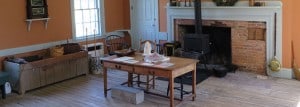What Does Your Kitchen Say About You And How You Live?
By Mel Oles, Visitor Services and Programs Manager at Rose Hill Mansion and Johnston House
 Today we call the kitchen the heart of the home. Many new homes are designed with an open concept so for example parents can watch their children do their homework while they cook. We also do more than cooking in our kitchens. Guests are often welcome to eat, drink and converse in our kitchens as we cook.
Today we call the kitchen the heart of the home. Many new homes are designed with an open concept so for example parents can watch their children do their homework while they cook. We also do more than cooking in our kitchens. Guests are often welcome to eat, drink and converse in our kitchens as we cook.
Rose Hill Mansion’s kitchen is the oldest section of the house. It was built in 1809 and it was originally attached to the Rose’s house, which is now the Carriage House Visitor Center and Gift Shop. We see the kitchen as it might have looked when the Roses lived here (1809-1827). The Roses were tobacco farmers from Virginia and they brought with them 37 enslaved workers. An enslaved worker would have cooked in the kitchen until 1827 when slavery was abolished in New York State. Later families would hire mostly Irish immigrants to cook for them. Servants would spend much of their time in the kitchen especially the cook, since food preparation was so time consuming.
The mansion’s kitchen is missing three main elements compared to our modern kitchen – a sink, refrigerator, and stove. Technology has shaped our kitchens from open flame fireplaces that could be dangerous to our current electric or gas ranges. Ice houses were located outside and now we have refrigerators to keep our food from spoiling. Finally, the dry sinks were labor intensive compared to our indoor plumbing (i.e. faucets to make draining dirty water easier). These changes made our lives so much easier.
The first refrigerator was created by GE in 1911 but many homes wouldn’t get them to at least the 1940s. The families at Rose Hill would have used an ice house located outside the kitchen to keep the food fresh. The ice would be harvested from Seneca Lake during the winter months and stored in the ice house. The family could continue to replenish the ice as needed.

The kitchen at Rose Hill Mansion.
I bet many people don’t think twice about their sinks. Today we have hot and cold water faucets plus a drain. This may not seem much to us in modern times but it would have been a luxury to those in the past. The sink in the kitchen at Rose Hill is known as a dry sink. There is no drain for the dirty water so it would be carried back outside to be thrown away.
At Rose Hill there would have always been a cook to prepare the meals. During the Rose family period they would have cooked over an open flame in the hearth. It is often romanticized today; however, it would have been a laborious endeavor. The cook would need to master various methods of preparing dishes, utilizing special equipment and techniques. The Rose Hill kitchen also has a bake oven. The cook would know how to judge the temperature of the oven and when to take out the food by previous trial and error. There was no standardized yeast, temperature gauge and digital timers.
The surrounding area outside the kitchen was also used for other activities. In the back lawn near the kitchen animals could have been slaughtered, laundry hung, kitchen garden tended and chickens ran about in the lawn.
To learn more about kitchens of the past and the servants at Rose Hill, please join us for a tour. The tour schedule, admission and information can be found on our website.
Historic Geneva tells the stories of Geneva, New York. Discover these stories online and in person through the Geneva History Museum, Rose Hill Mansion, and Johnston House.

Very interesting and a good reminder about how much easier it is to prepare meals today.